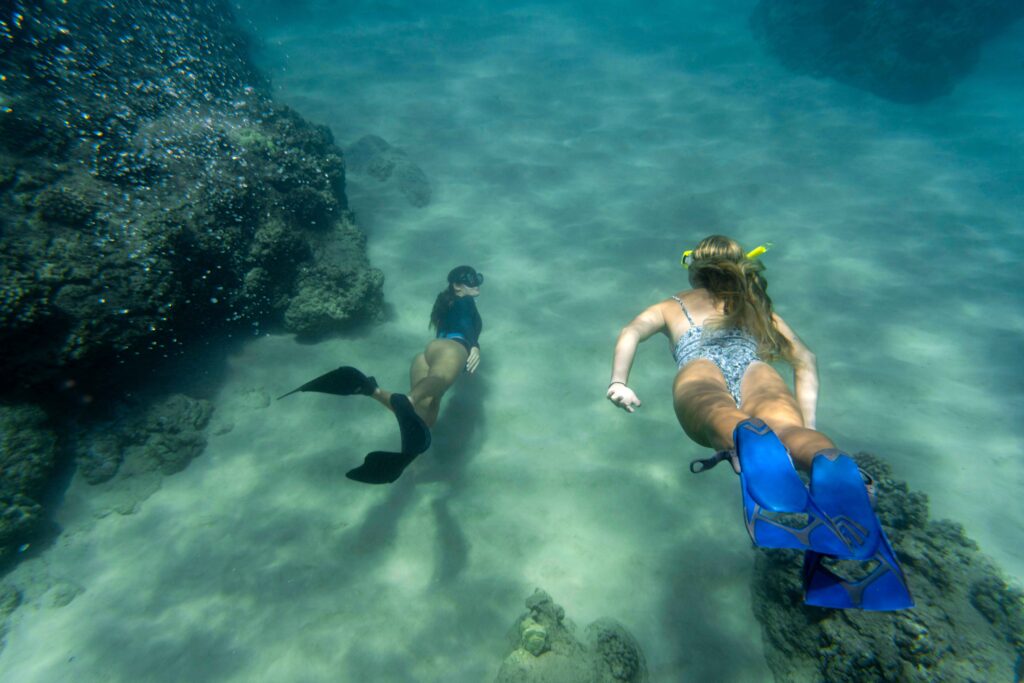Freshwater vs saltwater SCUBA diving offers two completely different underwater experiences for divers of all skill levels. From visibility and temperature to marine life and equipment needs, each environment presents unique benefits and challenges. Understanding the key differences between freshwater and saltwater scuba diving will help you choose the best location for your next dive adventure.

SCUBA Diving in Freshwater
Freshwater diving occurs in rivers, lakes, and quarries. In saltwater settings, these ecosystems typically have less visibility, colder temperatures, and fewer marine organisms. Exploration of underwater caverns, swimming with freshwater fish and sea turtles, and looking for historical artifacts are just a few of the unusual experiences that freshwater diving can provide.
Disadvantages of diving in freshwater
Freshwater environments often contain fewer marine species than saltwater habitats. Although freshwater visibility can sometimes be better than saltwater visibility, it can also be poor in some circumstances, especially if there is a lot of silt or algae. Due to the cooler temperatures, freshwater diving frequently requires more equipment than saltwater diving, such as heavier wetsuits or dry suits.
Advantages of diving in freshwater
Compared to saltwater, freshwater settings can have clear water, but they can also have reduced vision because of silt, algae, or contaminants. Since freshwater habitats are often colder than saltwater ones, diving can be uncomfortable, and demand for thicker wetsuits or dry suits for additional thermal insulation. Due to this, diving may become more expensive and, for some divers, less pleasurable.
SCUBA Diving in Saltwater
The usual locations for saltwater diving include coral reefs, oceans, and seas. Warmer conditions, better visibility, and a wider diversity of marine life, including coral, fish, sharks, and sea turtles, are typical characteristics of these settings. Saltwater diving is physically strenuous because of large currents, deeper depths, and more difficult dive planning because of tidal variations.
Advantages of diving in saltwater
Abundant marine life, including coral reefs, tropical fish, dolphins, whales, and sea turtles, live in saltwater habitats. Divers can see numerous marine organisms and watch them behave naturally. Diving can be more pleasant because salt water is typically warmer than freshwater, particularly in tropical settings.
Disadvantages of diving in saltwater
In warm areas, saltwater can make divers more susceptible to dehydration. Before, during, and after dives, it’s crucial to stay hydrated. Invest in equipment designed to take on extreme temperatures or dark conditions. Investing in equipment may increase dive costs and the need for additional training and expertise.
Final Thoughts on Freshwater vs Saltwater SCUBA Diving
Freshwater vs saltwater SCUBA diving each delivers unique rewards to divers based on location, experience level, and interest. Freshwater diving provides calm environments, historical finds, and clearer logistics, while saltwater diving offers vibrant coral reefs, diverse marine species, and world-famous dive destinations. Both environments require proper equipment, training, and safety planning.
No matter which environment you choose, certification, proper exposure protection, and responsible dive behavior are critical for a successful experience. Divers should always follow local regulations and dive within their limits. For personalized dive training and guided excursions, contact By the Shore SCUBA Instruction to explore your next underwater adventure safely.
Safety First!
Complete your training and certification requirements for saltwater and freshwater diving. Abide by safety procedures to ensure a fun and safe dive. Your personal preferences and the kind of diving experience you’re seeking will influence where you go diving. For a secure and memorable diving experience, check out By the Shore SCUBA Instruction.
Reference Weblinks
https://www.scubadivingearth.com/is-scuba-diving-in-freshwater-different-from-saltwater
https://www.social-diving.com/freshwater-vs-saltwater-diving
